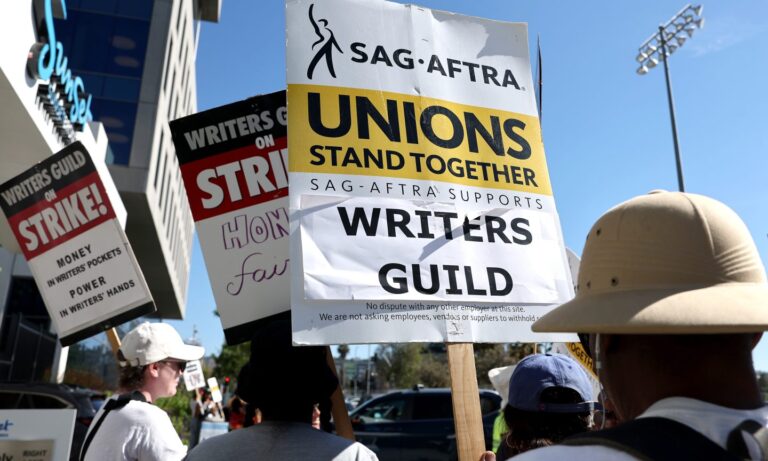Hollywood has officially gone on strike.
Screen Actors Guild and American Federation of Television and Radio Artists, the unions representing over 160,000 actors and actresses, voted to go on strike Thursday. This is the first union strike since 2000.
SAG-AFTRA has joined the Writers Guild of America, the union of TV and Film writers. Strike officially starts at midnight Friday. In 1960, Ronald Reagan led SAG at that time and the last time Hollywood writers and actors were on strike together was in 1960. The dual strike today will effectively shut down Hollywood.
Fran Drescher, SAG-AFTRA President (yes, she is the “Nanny” of fame), said at a Thursday press conference that, after the announcement, it was “with great sadness, we arrived to this crossroads. But we had no other choice.” Here, we are the ones who suffer. A very greedy person is victimizing us. The way that the business partners have treated us is shocking. It is amazing how different we are in so many areas. They claim to be poor and that they are losing money while giving millions to their CEOs. This is disgusting .”
What you need to know about the Hollywood Strike
A Hollywood shutdown will have a number of effects on your ability to consume new entertainment.
-
There’s no new season of TV series coming soon.
-
All upcoming projects that feature A-list (and B, C and other actors) are either put on hold or cancelled.
-
The same will apply to all publicity regarding upcoming films. This includes all promotional appearances as well as online videos of actors chatting, social media posts by actors, press conferences and award shows such the Emmys.
The writers’ strike had already put a halt to a number of projects, including film and television. This includes television shows such as “The Last of Us”, “The Old Man”, “Saturday Night Live”, “Severance”, “Stranger Things”, “The Penguin”, “Yellowjackets”, and the prequel to “Yellowstone”, “1923.”
After the announcement of the strike, any remaining projects will be shut down quickly. The strike will not affect some TV shows, such as news broadcasts, soap operas, and sports. Animation movie productions will also continue.
Even if you are not a fan of most entertainment broadcasts, you may still want to know how these strikes happened.
Why do actors strike?
SAG-AFTRA and Alliance of Motion Picture and Television Producers are in talks since the 7th of June, following a union strike authorization. AMPTP represents Hollywood’s major studios, including Amazon, Apple and Disney. It also includes NBCUniversal and Netflix.
The union for actors argues the alliance does not acknowledge the impact industry changes have had on actors, specifically how streaming has undercut actors’ wages over the past decade. SAG-AFTRA says artificial intelligence is a “threat to the creative professions”. According to their July 13 press statement, they also say that it poses a “threat to existentially threaten them.”
Both parties failed to come up with a solution before the deadline of late Wednesday night. On Thursday, the union voted to approve a strike.
AMPTP released a press release following the breakdown of negotiations early on Thursday morning. The union refused to accept its offer of “historic pay and residual increase, significantly higher caps on health and pension contributions, auditions protections and shortened series options periods.”
Duncan Crabtree-Ireland was SAG-AFTRA’s chief negotiator and national executive director at the press conference held by SAG-AFTRA on Thursday. He said, “They proposed to scan our background actors, pay them for a day’s work, then give their companies ownership of that image and likeness to allow their use in perpetuity, without consent or compensation. If you thought that was a revolutionary proposal, then I would suggest you reconsider .”
Why is there a writers’ strike?
WGA members in both the west and east have been striking for over two months. After six weeks of negotiation with AMPTP, the strike began on May 2. The union wants writers to be protected and receive a fairer wage.
According to the WGA’s May 1, 2018 press release, the union shares the same frustrations as actors: that streaming services are eroding compensation and creating “a gig economy within a unionized workforce”. They have also “opened up the doors to writers becoming a completely freelance profession.”
WGA mentions AI’s disruption in the industry. The WGA doesn’t wish to ban AI per se but would prefer that the use of AI be regulated, and writers get credit for projects before AI.
According to Deadline, a website that covers the entertainment industry, the only official statement from AMPTP was: “As our companies have always said, we are committed to working out solutions for our constantly changing business to the benefit of all those involved.”
How long can the strike last?
Anyone can guess the duration of strike by actors. Drescher responded to a question at the Thursday press conference about the duration of the strike by saying, “That is up to them.” Tonight, we’re willing to talk to them. “All of this was due to their behaviour.”
SAG-AFTRA last went on strike in 2000. It lasted for six months. It was about the pay for advertisements. Since June 1980 (AFTRA and SAG), actors have not struck against studios, TV networks and film producers. This strike continued until October 23, 1980.
Writers are still striking. Deadline said on Tuesday the AMPTP is determined to hold out until writers are forced back to work because they run out of funds. The WGA’s last strike started in 2007, and it lasted 14 weeks.
The Directors Guild of America and AMPTP have reached a three-year contract ahead of DGA contract expiration date of June 30, 2006. The negotiations began May 10, and ended on June 3, New contract contains provisions on safety, diversity, creative rights, as well as global streaming residuals and wage increases. The contract also sets a standard that AI generated by generative algorithms cannot replace the duties of DGA members.
Image by Mario Tama/Getty Image News
